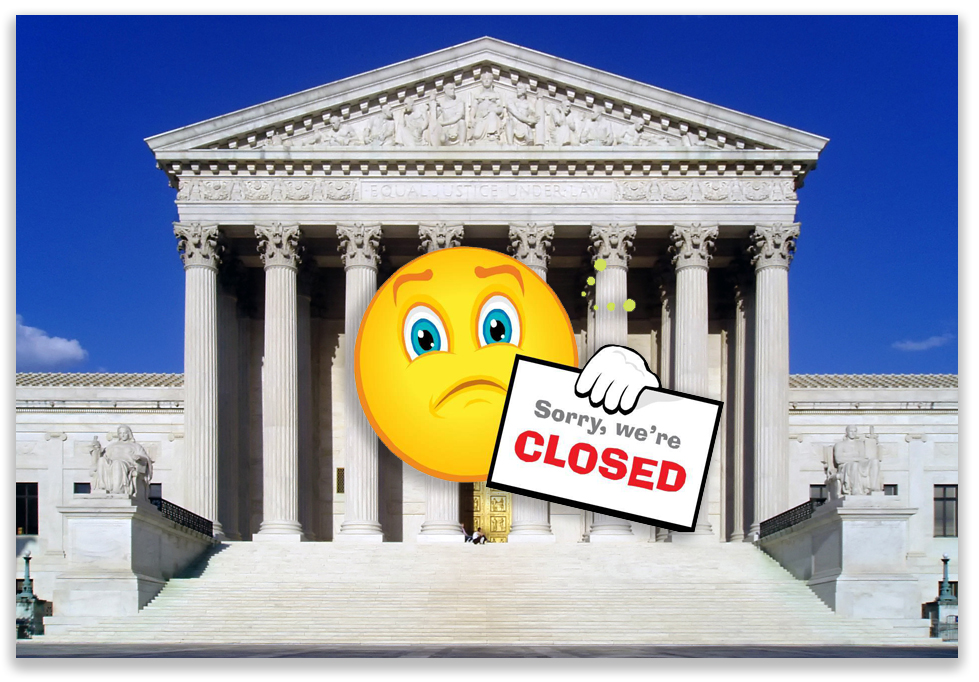We post news and comment on federal criminal justice issues, focused primarily on trial and post-conviction matters, legislative initiatives, and sentencing issues.

JONES TSUNAMI ROLLING OVER PENDING CASES
The two-week-old Jones v. Hendrix decision is claiming its first victims.
 You recall that in Jones, the Supreme Court held that if a federal prisoner has previously filed a § 2255 motion – even one addressing a completely unrelated issue – he or she cannot file a second post-conviction challenge arguing that, under a new Supreme Court decision that changes a statutory interpretation, even if the change means that the prisoner was not guilty of a crime.
You recall that in Jones, the Supreme Court held that if a federal prisoner has previously filed a § 2255 motion – even one addressing a completely unrelated issue – he or she cannot file a second post-conviction challenge arguing that, under a new Supreme Court decision that changes a statutory interpretation, even if the change means that the prisoner was not guilty of a crime.
In other words, as attorney Adam Unikowsky blogged last week, “Even if the federal prisoner is indisputably innocent, the prisoner must serve his full sentence.”
I know of a number of pending district court 28 USC § 2241 cases that Jones has already torpedoed. Last Friday, the 7th Circuit added to the carnage.
DeAngelo Sanders had argued in a 28 USC § 2241 habeas petition that he did not have the required three prior drug or violent convictions for a mandatory minimum 15-year sentence under the Armed Career Criminal Act. His filing came well after his § 2255 post-conviction motion had been denied, and only because the Circuit had just ruled that a conviction for Illinois residential burglary cannot be used to enhance an ACCA sentence.
The Circuit was in the middle of considering whether DeAngelo could rely on the 28 USC § 2255(e) saving clause to raise his actual-innocence-of-ACCA-sentence when the Supreme Court handed down Jones. Last Friday, the 7th denied DeAngelo’s case.
The Supreme Court’s Jones decision ruled that “Section 2255(h) specifies the two limited conditions in which Congress has permitted federal prisoners to bring second or successive collateral attacks on their sentences,” the Circuit said. “The inability of a prisoner with a statutory claim to satisfy those conditions does not mean that he can bring his claim in a habeas petition under the saving clause. It means that he cannot bring it at all. Congress has chosen finality over error correction in his case.”
 The same thing happened to Carlous Horton’s habeas petition, which argued that his mandatory life sentence for drug distribution, based on three prior drug trafficking convictions, should be vacated. “The government conceded that two of Carlous’s prior drug convictions are not proper § 841 predicates under Mathis,” the 7th said last Friday, “and a third – the 1995 Illinois cocaine conviction mentioned above – also could not be counted as a predicate under a recent Circuit decision in United States v. Ruth. But the government opposed relief, arguing that although Carlous’s habeas petition was premised on new statutory interpretation developments, he had not been previously precluded by Eighth Circuit precedent from making” the same arguments.
The same thing happened to Carlous Horton’s habeas petition, which argued that his mandatory life sentence for drug distribution, based on three prior drug trafficking convictions, should be vacated. “The government conceded that two of Carlous’s prior drug convictions are not proper § 841 predicates under Mathis,” the 7th said last Friday, “and a third – the 1995 Illinois cocaine conviction mentioned above – also could not be counted as a predicate under a recent Circuit decision in United States v. Ruth. But the government opposed relief, arguing that although Carlous’s habeas petition was premised on new statutory interpretation developments, he had not been previously precluded by Eighth Circuit precedent from making” the same arguments.
Last Friday, the Circuit dismissed Carlous’s case, holding that Jones kicked the legs from under his claim as well.
Adam Unikowsky concedes that the Jones majority opinion, written by Justice Thomas, “is well-written and persuasive. He puts forward a powerful argument that under the plain text of the applicable federal statutes, federal prisoners are forbidden from bringing this type of challenge. Justice Jackson’s dissent is also well-written and persuasive. She puts forward a powerful argument that the majority’s interpretation conflicts with congressional intent and would lead to unfair consequences. In the end, Jones presents a tough, close issue.”
Rather than focus on Jones’s merits, Unikowsky argues for a statutory fix that would allow prisoners to file successive Section 2255 petitions when new Supreme Court decisions establish their innocence. “This is not a tough, close issue,” he writes. “It is an obviously correct position that should prevail by unanimous voice votes in the House and Senate.”
 Writing in Law 360, Northeastern University law professor Daniel Medwed agreed. “Perhaps Congress could add a third route, and even tailor it narrowly to gain bipartisan support,” Medwed wrote. “Specifically, Congress could change the law to permit a successive or second habeas filing when the Supreme Court has recognized a new statutory principle that is made retroactive and that could be relied on by those in custody to claim legal innocence. This would address Justice Jackson’s core concern about ‘slamming the courtroom doors to a possibly innocent person,’ while simultaneously avoiding any reference to the saving clause, let alone making that provision the ‘license for unbounded error correction’ that Justice Thomas feared.”
Writing in Law 360, Northeastern University law professor Daniel Medwed agreed. “Perhaps Congress could add a third route, and even tailor it narrowly to gain bipartisan support,” Medwed wrote. “Specifically, Congress could change the law to permit a successive or second habeas filing when the Supreme Court has recognized a new statutory principle that is made retroactive and that could be relied on by those in custody to claim legal innocence. This would address Justice Jackson’s core concern about ‘slamming the courtroom doors to a possibly innocent person,’ while simultaneously avoiding any reference to the saving clause, let alone making that provision the ‘license for unbounded error correction’ that Justice Thomas feared.”
Sanders v. Joseph, Case No. 19-2504, 2023 U.S. App. LEXIS 17176 (7th Cir. July 7, 2023)
Horton v. Lovett, Case No. 21-1004, 2023 U.S. App. LEXIS 17177 (7th Cir. July 7, 2023)
Adam’s Legal Newsletter, Imprisoning innocent people is bad (July 2, 2023)
Law360, Justices’ Habeas Ruling Further Saps Writ Of Its Strength (July 7, 2023)
– Thomas L. Root

